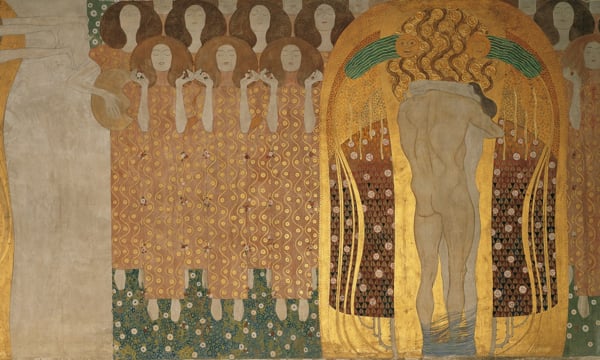Law & Politics
Austria Rules Against Restituting Klimt’s Beethoven Frieze to Heirs
Will the Austrian government follow the panel's recommendation?

Will the Austrian government follow the panel's recommendation?

Henri Neuendorf

An Austrian Art Restitution Advisory Board has ruled against returning one of Gustav Klimt’s most famous paintings to the heirs of the Jewish collector August Lederer, the Guardian reports. Although the panel’s verdicts are not legally binding, the government usually adheres to its recommendations.
Klimt’s 34-meter-long (111.5 feet) Beethoven Frieze (1902), one of the artist’s most celebrated works, was looted from the collection of the Jewish industrialist August Lederer by the Nazis after the family was forced to flee to Switzerland following Germany’s annexation of Austria in 1938.
The painting was returned to August Lederer’s son Erich after World War II. However, due to Austrian heritage protection legislation he was barred from exporting the artwork. The heirs of the Lederers argue this effectively forced him to sell the masterpiece to the Austrian state in 1972 at a drastically reduced price of $750,000.
According to the Globe and Mail, Austria’s art restitution legislation was changed in 2009 to include works whose owners were pressured to sell under duress. In 2013, two groups of Lederer heirs filed a suit seeking to reclaim the frieze from the Austrian state under that revised restitution legislation.
However, the BBC reports that Clemens Jabloner, head of the panel, announced in a statement on Friday that “it is not the case that the export procedure was used as a tool to force Lederer into agreement.”
The Vienna Secession Museum, where the painting has been on permanent display since 1986, has always maintained that Erich Lederer voluntarily negotiated and received the price of $750,000. The institution also affirms that the Austrian government paid for the extensive restoration that the work required.
In a statement, Herwig Kempinger, the institution’s president, welcomed the panel’s verdict, saying “the Secession is the most appropriate location for the presentation of this important work of Viennese art nouveau.”
Meanwhile, Jabloner denied that the ruling would damage Austria’s reputation. He acknowledged that “restitution plays an important role because . . . there were very important collectors of art so Austria has a lot to do.” He also pointed out that “Austria is not the only state with such a situation, but it is the only state with a legal basis for returning those artifacts.”
The German state’s handling of the restitution of a looted Matisse painting to the heirs of the French art dealer Paul Rosenberg was criticized by the family’s attorney last week. who claims the German government is imposing excessive bureaucratic requirements on the heirs to keep hold of the painting (see Rosenberg Heirs’ Claim to Gurlitt Matisse Stalled).
For more of artnet News’s coverage of art restitution cases see Berlin Restitutes Eight Looted Artworks to Jewish Heirs, Leopold Museum Defends Against Restitution Claims, France’s Supreme Court Rejects Austrian Restitution Claim, and Helen Mirren Champions Restitution of Nazi-Looted Art.